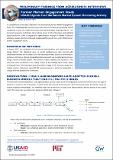| dc.contributor.author | Picchione, Katherine | |
| dc.contributor.author | Blair, Courtney | |
| dc.contributor.author | Goentzel, Jarrod | |
| dc.contributor.author | Gralla, Erica | |
| dc.contributor.author | Russell, Timothy Edward | |
| dc.contributor.author | Wiseman, Micaela | |
| dc.date.accessioned | 2022-05-26T00:07:53Z | |
| dc.date.available | 2022-05-26T00:07:53Z | |
| dc.date.issued | 2022-05-26 | |
| dc.identifier.uri | https://hdl.handle.net/1721.1/142756 | |
| dc.description | KEY FINDINGS
1. Small agribusinesses have adopted a spectrum of flexible business models.
2. Information is spread through relationships between market actors.
3. Most businesses rely on personal connections for credit; there is widespread distrust of formal financial
institutions | en_US |
| dc.description.sponsorship | USAID | en_US |
| dc.language.iso | en_US | en_US |
| dc.rights | Attribution-ShareAlike 3.0 United States | * |
| dc.rights.uri | http://creativecommons.org/licenses/by-sa/3.0/us/ | * |
| dc.subject | USAID | en_US |
| dc.subject | Uganda | en_US |
| dc.subject | Market engagement | en_US |
| dc.subject | Farmers | en_US |
| dc.title | Preliminary Findings From Agribusiness Interviews | en_US |
| dc.type | Technical Report | en_US |
